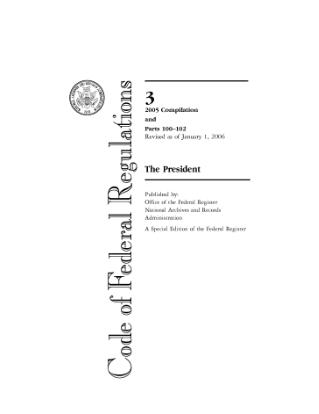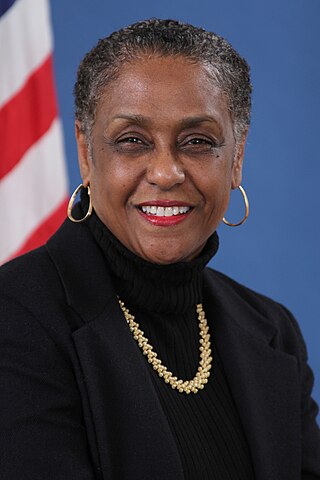Related Research Articles

In the United States, an executive order is a directive by the president of the United States that manages operations of the federal government. The legal or constitutional basis for executive orders has multiple sources. Article Two of the United States Constitution gives presidents broad executive and enforcement authority to use their discretion to determine how to enforce the law or to otherwise manage the resources and staff of the executive branch. The ability to make such orders is also based on expressed or implied Acts of Congress that delegate to the president some degree of discretionary power. The vast majority of executive orders are proposed by federal agencies before being issued by the president.
The United States Government Publishing Office, formerly the United States Government Printing Office, is an agency of the legislative branch of the United States Federal government. The office produces and distributes information products and services for all three branches of the Federal Government, including U.S. passports for the Department of State as well as the official publications of the Supreme Court, the Congress, the Executive Office of the President, executive departments, and independent agencies.

In the law of the United States, the Code of Federal Regulations (CFR) is the codification of the general and permanent regulations promulgated by the executive departments and agencies of the federal government of the United States. The CFR is divided into 50 titles that represent broad areas subject to federal regulation.

In the United States, the presidential library system is a nationwide network of 16 libraries administered by the Office of Presidential Libraries, which is part of the National Archives and Records Administration (NARA). These are repositories for preserving and making available the papers, records, collections and other historical materials of every president of the United States since Herbert Hoover, the 31st president from 1929–1933. In addition to the library services, museum exhibitions concerning the presidency are displayed.

The Federal Register is the official journal of the federal government of the United States that contains government agency rules, proposed rules, and public notices. It is published every weekday, except on federal holidays. The final rules promulgated by a federal agency and published in the Federal Register are ultimately reorganized by topic or subject matter and codified in the Code of Federal Regulations (CFR), which is updated quarterly.

The Congressional Record is the official record of the proceedings and debates of the United States Congress, published by the United States Government Publishing Office and issued when Congress is in session. The Congressional Record Index is updated daily online and published monthly. At the end of a session of Congress, the daily editions are compiled in bound volumes constituting the permanent edition. Chapter 9 of Title 44 of the United States Code authorizes publication of the Congressional Record.

The Federal Depository Library Program (FDLP) is a government program created to make U.S. federal government publications available to the public at no cost. As of April 2021, there are 1,114 depository libraries in the United States and its territories. A "government publication" is defined in the U.S. Code as "informational matter which is published as an individual document at Government expense, or as required by law".
Debategate or briefing-gate was a political scandal affecting the administration of Ronald Reagan; it took place in the final days of the 1980 presidential election. Reagan's team acquired President Jimmy Carter's briefing papers, classified top secret, that Carter used in preparation for the October 28, 1980 debate with Reagan. The briefing papers were never specified to be either vital strategy memos or just routine position papers. This leak of campaign papers was not divulged to the public until late June 1983, after Laurence Barrett published Gambling with History: Reagan in the White House, an in-depth account of the Reagan administration's first two years.
The United States Congressional Serial Set began in 1817 as the official collection of reports and documents of the United States Congress. The collection was published in a "serial" fashion, hence its name. It has been described as the "nation's most treasured publication" and beloved by librarians as "part of their most valued holdings."
Legal research is the process of identifying and retrieving information to support legal arguments and decisions. Finding relevant legal information can be challenging and may involve the use of electronic research tools as well as printed books and materials. However, many resources that are useful for legal research are fee-based, and many are not easily accessible.

The WashingtonPapers, also known as The Papers of George Washington, is a project dedicated to the publication of comprehensive letterpress and digital editions of George and Martha Washington’s papers. Founded at the University of Virginia in 1968 as the Papers of George Washington, the Washington Papers is an expansive project that includes the papers and documents of George Washington as well as of individuals close to him. The Washington Papers aims to place Washington in a larger context and to bring individuals, such as Martha Washington and Washington family members, into sharper focus. The project is currently headed by editor in chief and director Jennifer E. Steenshorne, and is the largest collection of its type. The project is funded in part by the National Endowment for the Humanities, the National Historical Publications and Records Commission, the Packard Humanities Institute, the Mount Vernon Ladies' Association, the University of Virginia, the Florence Gould Foundation, and other private donors.

William Joseph Boarman was an American printer who served as the 26th Public Printer of the United States. Boarman was a labor union leader and government consultant, and served as senior vice-president of the Communications Workers of America (CWA) and president of that union's Printing, Publishing & Media Works Sector.
Title 1 of the Code of Federal Regulations, titled General Provisions, is a United States federal government regulation.

The Papers of Abraham Lincoln is a documentary editing project dedicated to identifying, imaging, transcribing, annotating, and publishing online all documents written by or to Abraham Lincoln during his lifetime (1809–1865).
The Papers of James Madison project was established in 1956 to collect and publish in a comprehensive letterpress edition the correspondence and other writings of James Madison, the fourth president of the United States.

Davita Vance-Cooks is an American business executive who served as the 27th Public Printer of the United States and the 1st Director of the U.S. Government Publishing Office (GPO). Vance-Cooks is a business executive with more than 30 years of private sector and federal government management experience. She was the first woman and first African-American to lead the agency, whose mission since its establishment in 1861 is to Keep America Informed. As the provider of official federal government information in digital and printed formats, the GPO produces the Congressional Record, the Federal Register, U.S. passports, and a wide variety of other publications. The agency provides free public access to government information products through federal depository libraries nationwide as well as free online access via GPO's Federal Digital System.
The Printing Act of 1895 was a law designed to centralize in the United States Government Printing Office the printing, binding, and distribution of U.S. Government documents. The Act revised public printing laws and established the roles of the Federal Depository Library Program (FDLP) and the Government Printing Office (GPO) in distributing government information. The act also assigned leadership of the program to the Superintendent of Public Documents, who would be under the control of the GPO,

The Federal Register Modernization Act was a bill that would require the Federal Register to be published, rather than printed, and that documents in the Federal Register be made available for sale or distribution to the public in published form.
The Daily Compilation of Presidential Documents collection is composed of the Daily Compilation of Presidential Documents and its predecessor, the Weekly Compilation of Presidential Documents*. Since 1993, it has been published by the Office of the Federal Register, National Archives and Records Administration (NARA) under the authority of the Federal Register Act.
Ending Discriminatory Bans on Entry to The United States was the second presidential proclamation signed by President Joe Biden on January 20, 2021. The proclamation revoked Executive Order 13780, titled Protecting the Nation from Foreign Terrorist Entry into the United States, which had been signed by U.S. President Donald Trump on March 6, 2017, and Proclamations 9645, 9723, and 9983.